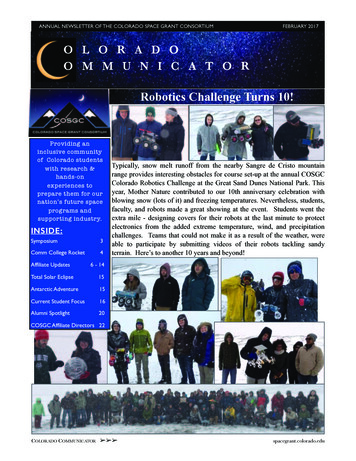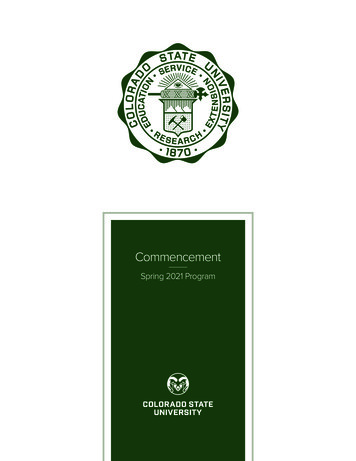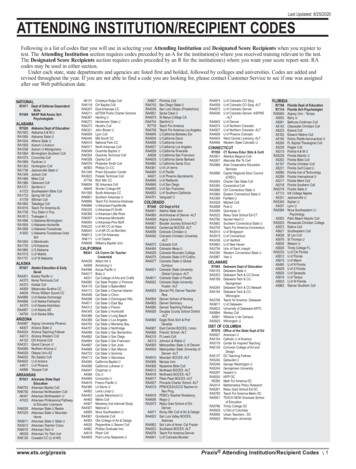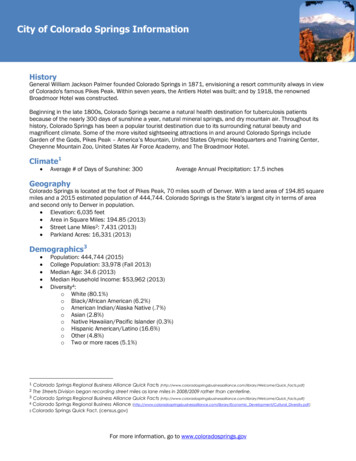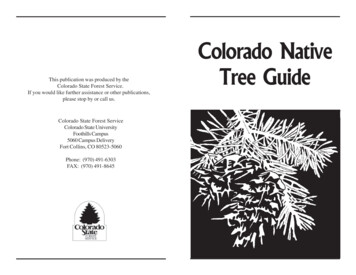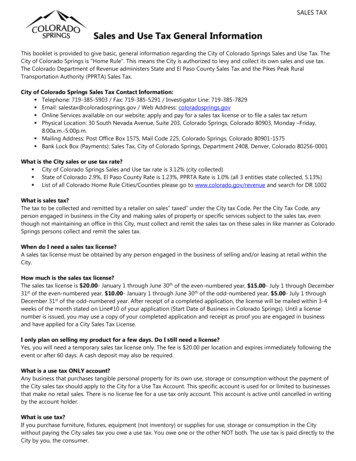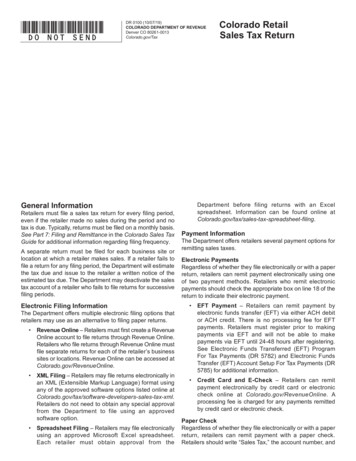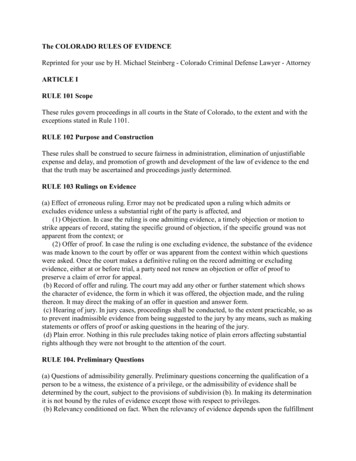
Transcription
The COLORADO RULES OF EVIDENCEReprinted for your use by H. Michael Steinberg - Colorado Criminal Defense Lawyer - AttorneyARTICLE IRULE 101 ScopeThese rules govern proceedings in all courts in the State of Colorado, to the extent and with theexceptions stated in Rule 1101.RULE 102 Purpose and ConstructionThese rules shall be construed to secure fairness in administration, elimination of unjustifiableexpense and delay, and promotion of growth and development of the law of evidence to the endthat the truth may be ascertained and proceedings justly determined.RULE 103 Rulings on Evidence(a) Effect of erroneous ruling. Error may not be predicated upon a ruling which admits orexcludes evidence unless a substantial right of the party is affected, and(1) Objection. In case the ruling is one admitting evidence, a timely objection or motion tostrike appears of record, stating the specific ground of objection, if the specific ground was notapparent from the context; or(2) Offer of proof. In case the ruling is one excluding evidence, the substance of the evidencewas made known to the court by offer or was apparent from the context within which questionswere asked. Once the court makes a definitive ruling on the record admitting or excludingevidence, either at or before trial, a party need not renew an objection or offer of proof topreserve a claim of error for appeal.(b) Record of offer and ruling. The court may add any other or further statement which showsthe character of evidence, the form in which it was offered, the objection made, and the rulingthereon. It may direct the making of an offer in question and answer form.(c) Hearing of jury. In jury cases, proceedings shall be conducted, to the extent practicable, so asto prevent inadmissible evidence from being suggested to the jury by any means, such as makingstatements or offers of proof or asking questions in the hearing of the jury.(d) Plain error. Nothing in this rule precludes taking notice of plain errors affecting substantialrights although they were not brought to the attention of the court.RULE 104. Preliminary Questions(a) Questions of admissibility generally. Preliminary questions concerning the qualification of aperson to be a witness, the existence of a privilege, or the admissibility of evidence shall bedetermined by the court, subject to the provisions of subdivision (b). In making its determinationit is not bound by the rules of evidence except those with respect to privileges.(b) Relevancy conditioned on fact. When the relevancy of evidence depends upon the fulfillment
of a condition of fact, the court shall admit it upon, or subject to, the introduction of evidencesufficient to support a finding of the fulfillment of the condition.(c) Hearing of jury. Hearings on the admissibility of confessions shall in all cases be conductedout of the hearing of the jury. Hearings on other preliminary matters shall be so conducted whenthe interests of justice require or, when an accused is a witness, if he so requests.(d) Testimony by accused. The accused does not, by testifying upon a preliminary matter, subjecthimself to cross-examination as to other issues in the case.(e) Weight and credibility. This rules does not limit the right of a party to introduce before thejury evidence relevant to weight or credibility.RULE 105 Limited AdmissibilityWhen evidence which is admissible as to one party or for one purpose but not admissible as toanother party or for another purpose is admitted, the court, upon request, shall restrict theevidence to its proper scope and instruct the jury accordingly.RULE 106 Remainder of or Related Writings or Recorded StatementsWhen a writing or recorded statement or part there of is introduced by a party, an adverse partymay require him at that time to introduce any other part or any other writing or recordedstatement which ought in fairness to be considered contemporaneously with it.ARTICLE IIRULE 201 Judicial Notice of Adjudicative Facts(a) Scope of rule. This rule governs only judicial notice of adjudicative facts.(b) Kinds of facts. A judicially noticed fact must be one not subject to reasonable dispute in thatit is either (1) generally known within the territorial jurisdiction of the trial court, or (2) capableof accurate and ready determination by resort to sources whose accuracy cannot reasonably bequestioned.(c) When discretionary. A court may take judicial notice, whether requested or not.(d) When mandatory. A court shall take judicial notice if requested by a party and supplied withthe necessary information.(e) Opportunity to be heard. A party is entitled upon timely request to an opportunity to be heardas to the propriety of taking judicial notice and the tenor of the matter noticed. In the absence ofprior notification, the request may be made after judicial notice has been taken.(f) Time of taking notice. Judicial notice may be taken at any stage of the proceeding.(g) Instructing jury. In a civil action or proceeding, the court shall instruct the jury to accept asconclusive any fact judicially noticed. In a criminal case, the court shall instruct the jury that itmay, but is not required to, accept as conclusive any fact judicially noticed.
ARTICLE IIIRULE 301 Presumptions in General in Civil Actions and ProceedingsIn all civil actions and proceedings not otherwise provided for by statute or by these rules, apresumptions imposes upon the party against whom it is directed the burden of going forwardwith evidence to rebut or meet the presumption, but does not shift to such party the burden ofproof in the sense of the risk of non-persuasion, which remains throughout the trial upon theparty on whom it was originally cast.ARTICLE IVRULE 401 Definition of "Relevant Evidence""Relevant evidence" means evidence having any tendency to make the existence of any fact thatis of consequence to the determination of the action more probable or less probable than it wouldbe without the evidence.RULE 402 Relevant Evidence Generally Admissible; Irrelevant Evidence InadmissibleAll relevant evidence is admissible, except as otherwise provided by the Constitution of theUnited States, by the Constitution of the State of Colorado, by these rules, or by other rulesprescribed by the Supreme Court or by the statutes of the State of Colorado. Evidence which isnot relevant is not admissible.RULE 403 Exclusion of Relevant Evidence on Grounds of Prejudice, Confusion, or Wasteof TimeAlthough relevant, evidence may be excluded if its probative value is substantially outweighedby the danger of unfair prejudice, confusion of the issues, or misleading the jury, or byconsiderations of undue delay, waste of time, or needless presentation of cumulative evidence.RULE 404 Character Evidence Not Admissible to Prove Conduct; Exceptions; OtherCrimes(a) Character evidence generally. Evidence of a person's character or a trait of his character is notadmissible for the purpose of proving that he acted in conformity therewith on a particularoccasion, except:(1) Character of accused. Evidence of a pertinent trait of his character offered by an accused,or by the prosecution to rebut the same or if evidence of the alleged victim¹s character foraggressiveness or violence is offered by an accused and admitted under Rule 404(a)(2), evidenceof the same trait of character of the accused offered by the prosecution;(2) Character of victim. Evidence of a pertinent trait of character of the victim of the crimeoffered by an accused, or by the prosecution to rebut the same, or evidence of a character trait ofpeacefulness of the victim offered by the prosecution in a homicide case to rebut evidence that
the victim was the first aggressor;(3) Character of witness. Evidence of the character of a witness as provided in Rules 607,608, and 13-90-101.(b) Other crimes, wrongs, or acts. Evidence of other crimes, wrongs, or acts is not admissible toprove the character of a person in order to show that he acted in conformity therewith. It may,however, be admissible for other purposes, such as proof of motive, opportunities, intent,preparation, plan, knowledge, identity, or absence of mistake or accident.RULE 405 Methods of Proving Character(a) Reputation or opinion. In all cases in which evidence of character or a trait of character of aperson is admissible, proof may be made by testimony as to reputation or by testimony in theform of an opinion. On cross-examination, inquiry is allowable into relevant specific instances ofconduct.(b) Specific instances of conduct. Except as limited by § 16-10-301 and 18-3-407, C.R.S. 1973(Volume 8, 1978 Repl. Vol.), in cases in which character or a trait of character of a person is anessential element of a charge, claim or defense, proof may also be made of specific instances ofhis conduct.RULE 406 Habit; Routine PracticeEvidence of the habit of a person or of the routine practice of an organization, whethercorroborated or not and regardless of the presence of eyewitnesses, is relevant to prove that theconduct of the person or organization on a particular occasion was in conformity with the habitor routine practice.RULE 407 Subsequent Remedial MeasuresWhen after an event, measures are taken which, if taken previously, would have made the eventless likely to occur, evidence of the subsequent measures is not admissible to prove negligence orculpable conduct in connection with the event. This rule does not require the exclusion ofevidence of subsequent measures when offered for another purpose, such as proving ownership,control, or feasibility of precautionary measures, if controverted, or impeachment.RULE 408 Compromise and Offers to CompromiseEvidence of (1) furnishing or offering or promising to furnish, or (2) accepting or offering orpromising to accept, a valuable consideration in compromising or attempting to compromise aclaim which was disputed as to either validity or amount, is not admissible to prove liability foror invalidity of the claim or its amount. Evidence of conduct or statements made in compromisenegotiations is likewise not admissible. This rule does not require the exclusion of any evidenceotherwise discoverable merely because it is presented in the course of compromise negotiations.This rule also does not require exclusion when the evidence is offered for another purpose, suchas proving bias or prejudice of a witness, negativing a contention of undue delay, or proving an
effort to obstruct a criminal investigation or prosecution.RULE 409 Payment of Medical and Similar ExpensesEvidence of furnishing or offering or promising to pay medical, hospital, or similar expensesoccasioned by an injury is not admissible to prove liability for the injury.RULE 410 Offer to Plead Guilty; Nolo Contendere; Withdrawn Pleas of GuiltyExcept as otherwise provided by statutes of the State of Colorado, evidence of a plea of guilty,later withdrawn, or a plea of nolo contendere, or of an offer to plead guilty or nolo contendere tothe crime charged or any other crime, or of statements made in any connection with any of theforegoing pleas or offers, is not admissible in any civil or criminal action, case, or proceedingagainst the person who made the plea or offer. This rule shall not apply to the introduction ofvoluntary and reliable statements made in court on the record in connection with any of theforegoing pleas or offers where offered for impeachment purposes or in a subsequent prosecutionof the declarant for perjury or false statement.This rule shall be superseded by any amendment to the Colorado Rules of Criminal Procedurewhich is inconsistent with this rule, and which takes effect after the effective date of theseColorado Rules of Evidence.RULE 411 Liability InsuranceEvidence that a person was or was not insured against liability is not admissible upon the issuewhether he acted negligently or otherwise wrongfully. This rule does not require the exclusion ofevidence of insurance against liability when offered for another purpose, such as proof of agency,ownership, or control, or bias or prejudice of a witness.RULE 412 (No Colorado Rule) - C.R.S. § 18-3-407ARTICLE VRULE 501 Privileges Recognized Only as ProvidedExcept as otherwise required by the Constitution of the United States, the Constitution of theState of Colorado, statutes of the State of Colorado, rules prescribed by the Supreme Court of theState of Colorado pursuant to constitutional authority, or by the principles of the common law asthey may be interpreted by the courts of the State of Colorado in light of reason and experience,no person has a privilege to:(1) Refuse to be a witness; or(2) Refuse to disclose any matter; or(3) Refuse to produce any object or writing; or(4) Prevent another from being a witness or disclosing any matter or producing any object orwriting.
ARTICLE VIRULE 601 General Rule of CompetencyEvery person is competent to be a witness except as otherwise provided in these rules or in anystatute of the State of Colorado.RULE 602 Lack of Personal KnowledgeA witness may not testify to a matter unless evidence is introduced sufficient to support a findingthat he has personal knowledge of the matter. Evidence to prove personal knowledge may, butneed not, consist of the testimony of the witness himself. This rule is subject to the provisions ofRule 703, relating to opinion testimony by expert witnessesRULE 603 Oath or AffirmationBefore testifying, every witness shall be required to declare that he will testify truthfully, by oathor affirmation administered in a form calculated to awaken his conscience and impress his mindwith his duty to do so.RULE 604 InterpretersAn interpreter is subject to the provisions of these rules relating to qualification as an expert andthe administration of an oath or affirmation that he will make a true translation.RULE 605 Competency of Judge as WitnessThe judge presiding at the trial may not testify in that trial as a witness. No objection need bemade to preserve the point.RULE 606 Competency of Juror as Witness(a) At the trial. A member of the jury may not testify as a witness before that jury in the trial ofthe case in which he is sitting as a juror. No objection need be made in order to preserve thepoint.(b) Inquiry into validity of verdict or indictment. Upon an inquiry into the validity of a verdict orindictment, a juror may not testify as to any matter or statement occurring during the course ofthe jury's deliberations or to the effect of anything upon his or any other juror's mind or emotionsas influencing him to assent to or dissent from the verdict or indictment or concerning his mentalprocesses in connection therewith, except that a juror may testify on the question whetherextraneous prejudicial information was improperly brought to the jurors' attention or whether anyoutside influence was improperly brought to bear upon any juror. Nor may his affidavit orevidence of any statement by him concerning a matter about which he would be precluded fromtestifying be received for these purposes.
RULE 607 Who May ImpeachThe credibility of a witness may be attacked by any party, including the party calling him.Leading questions may be used for the purpose of attacking such credibility.RULE 608 Evidence of Character and Conduct of Witness(a) Opinion and reputation evidence of character. The credibility of a witness may be attacked orsupported by evidence in the form of opinion or reputation, but subject to these limitations: (1)the evidence may refer only to character for truthfulness or untruthfulness, and (2) evidence oftruthful character is admissible only after the character of the witness for truthfulness has beenattacked by opinion or reputation evidence or otherwise.(b) Specific instances of conduct. Specific instances of the conduct of a witness, for the purposeof attacking or supporting his credibility, other than conviction of crime as provided in13-90-101, C.R.S. 1973, may not be proved by extrinsic evidence. They may, however, in thediscretion of the court, if probative of truthfulness or untruthfulness, be inquired into oncross-examination of the witness (1) concerning his character for truthfulness or untruthfulness,or (2) concerning the character for truthfulness or untruthfulness of another witness as to whichcharacter the witness being cross-examined has testified.The giving of testimony, whether by an accused or by any other witness, does not operate as awaiver of his privilege against self-incrimination when examined with respect to matters whichrelate only to credibility.RULE 609 (No Colorado Rule) - C.R.S. § 13-90-101§ 13-90-101. Who may testify - interest. All persons, without exception, other than thosespecified in sections 13-90-102 to 13-90-108 may be witnesses. Neither parties nor other personswho have an interest in the event of an action or proceeding shall be excluded; nor those whohave been convicted of crime; nor persons on account of their opinions on matters of religiousbelief. In every case the credibility of the witness may be drawn in question, as now provided bylaw, but the conviction of any person for any felony may be shown for the purpose of affectingthe credibility of such witness. The fact of such conviction may be proved like any other fact, notof record, either by the witness himself, who shall be compelled to testify thereto, or by any otherperson cognizant of such conviction as impeaching testimony or by any other competenttestimony. Evidence of a previous conviction of a felony where the witness testifying wasconvicted five years prior to the time when the witness testifies shall not be admissible inevidence in any civil action.RULE 610 Religious Beliefs or OpinionsEvidence of the beliefs or opinions of a witness on matters of religion is not admissible for thepurposes of showing that by reason of their nature his credibility is impaired or enhanced.
RULE 611 Mode and Order of Interrogation and Presentation(a) Control by court. The court shall exercise reasonable control over the mode and order ofinterrogating witnesses and presenting evidence so as to (1) make the interrogation andpresentation effective for the ascertainment of the truth, (2) avoid needless consumption of time,and (3) protect witnesses from harassment or undue embarrassment.(b) Scope of cross-examination. Cross-examination should be limited to the subject matter of thedirect examination and matters affecting the credibility of the witness. The court may, in theexercise of discretion, permit inquiry into additional matters as if on direct examination.(c) Leading questions. Leading questions should not be used on the direct examination of awitness except as may be necessary to develop his testimony. Leading questions should bepermitted on cross-examination. When a party calls a hostile witness, and adverse party, or awitness identified with an adverse party, interrogation may be by leading questions.RULE 612 Writing Used to Refresh MemoryIf a witness uses a writing to refresh his memory for the purpose of testifying, either (1) while testifying, or(2) before testifying, ifthe court in its discretion determines it is necessary in the interests of justice, an adverse party isentitled to have the writing produced at the hearing, to inspect it, to cross-examine the witnessthereon, and to introduce in evidence those portions which relate to the testimony of the witness.If it is claimed that the writing contains matters not related to the subject matter of the testimonythe court shall examine the writing in camera, excise any portions not so related, and orderdelivery of the remainder to the party entitled thereto. Any portion withheld over objections shallbe preserved and made available to the appellate court in the event of an appeal. If a writing isnot produced or delivered pursuant to order under this rule, the court shall make any order justicerequires, except that in criminal cases when the prosecution elects not to comply, the order shallbe one striking the testimony, or, if the court in its discretion determines that the interests ofjustice so require, declaring a mistrial.RULE 613 Prior Statements of Witnesses(a) Examining witness concerning prior inconsistent statements for impeachment purposes.Before a witness may be examined for impeachment by prior inconsistent statement the examinermust call the attention of the witness to the particular time and occasion when, the place where,and the person to whom he made the statement. As a part of that foundation, the examiner mayrefer to the witness statement to bring to the attention of the witness any purported priorinconsistent statement. The exact language of the prior statement may be given.Where the witness denies or does not remember making the prior statement, extrinsic evidence,such as deposition, proving the utterance of the prior evidence is admissible. However, if awitness admits making the prior statement, additional extrinsic evidence that the prior statementwas made is inadmissible.Denial or failure to remember the prior statement is a prerequisite for the introduction of
extrinsic evidence to prove that the prior inconsistent statement was made.RULE 614 Calling and Interrogations of Witnesses by Court(a) Calling by court. The court may, on its own motion or at the suggestion of a party, callwitnesses and all parties are entitled to cross-examine witnesses thus called.(b) Interrogation by court. The court may interrogate witnesses, whether called by itself or by aparty.(c) Objections. Objections to the calling of witnesses by the court or to interrogation by it maybe made at the time or at the next available opportunity when the jury is not present.RULE 615 Exclusion of WitnessesAt the request of a party the court shall order witnesses excluded so that they cannot hear thetestimony of other witnesses, and it may make the order of its own motion. This rule does notauthorize exclusion of (1) a party who is a natural person, or (2) an officer or employee of a partywhich is not a natural person designated as its representative by its attorney, or (3) a personwhose presence is shown by a party to be essential to the presentation of his cause.ARTICLE VIIRULE 701 Opinion Testimony by Lay WitnessesIf the witness is not testifying as an expert, the witness¹ testimony in the form of opinions orinferences is limited to those opinions or inferences which are (a) rationally based on theperception of the witness, (b) helpful to a clear understanding of the witness¹ testimony or thedetermination of a fact in issue, and (c) not based on scientific, technical or other specializedknowledge within the scope of Rule 702.RULE 702 Testimony by ExpertsIf scientific, technical, or other specialized knowledge will assist the trier of fact to understandthe evidence or to determine a fact in issue, a witness qualified as an expert by knowledge, skill,experience, training, or education, may testify thereto in the form of an opinion or otherwise.RULE 703 Bases of Opinion Testimony by ExpertsThe facts or data in the particular case upon which an expert bases an opinion or inference maybe those perceived by or made known to him at or before the hearing. If of a type reasonablyrelied upon by experts in the particular field in forming opinions or inferences upon the subject,the facts or data need not be admissible in evidence in order for the opinion or inference to beadmitted. Facts or data that are otherwise inadmissible shall not be disclosed to the jury by theproponent of the opinion or inference unless the court determines that their probative value inassisting the jury to evaluate the expert¹s opinion substantially outweighs their prejudicial effect.
RULE 704 Opinion on Ultimate IssueTestimony in the form of an opinion or inference otherwise admissible is not objectionablebecause it embraces an ultimate issue to be decided by the trier of fact.RULE 705 Disclosure of Facts or Data Underlying Expert OpinionThe expert may testify in terms of opinion or inference and give reasons therefor without firsttestifying to the underlying facts or data, unless the court requires otherwise. The expert may inany event be required to disclose the underlying facts or data on cross-examination.RULE 706 Court Appointed Experts(a) Appointment. The court may on its own motion or on the motion of any party enter an orderto show cause why expert witnesses should not be appointed, and may request the parties tosubmit nominations. The court may appoint any expert witnesses agreed upon by the parties, andmay appoint expert witnesses of its own selection. Any expert witness shall not be appointed bythe court unless he consents to act. A witness so appointed shall be informed of his duties by thecourt in writing, a copy of which shall be filed with the clerk, or at a conference in which theparties shall have opportunity to participate. A witness so appointed shall advise the parties of hisfindings, if any; his deposition may be taken by any party; and he may be called to testify by thecourt or any party. He shall be subject to cross-examination by each party, including a partycalling him as a witness.(b) Compensation. Expert witnesses so appointed are entitled to reasonable compensation inwhatever sum the court may allow. The compensation thus fixed is payable from funds whichmay be provided by law in criminal cases and civil actions and proceedings involving justcompensation under the fifth amendment. In other civil actions and proceedings thecompensation shall be paid by the parties in such proportion and at such time as the court directs,and thereafter charged in like manner as other costs.(c) Disclosure of appointment. In the exercise of its discretion, the court may authorizedisclosure to the jury of the fact that the court appointed the expert witness.(d) Parties' experts of own selection. Nothing in this rule limits the parties in calling expertwitnesses of their own selection.ARTICLE VIIIRULE 801 DefinitionsThe following definitions apply under this article:(a) Statement. A "statement" is (1) an oral or written assertion or (2) nonverbal conduct of aperson, if it is intended by him to be communicative.(b) Declarant. A "declarant" is a person who makes a statement.(c) Hearsay. "Hearsay" is a statement other than one made by the declarant while testifying at thetrial or hearing, offered in evidence to prove the truth of the matter asserted.(d) Statements which are not hearsay. A statement is not hearsay if -
(1) Prior statement by witness. The declarant testifies at the trial or haring and is subject tocross-examination concerning the statement, and the statement is (A) inconsistent with histestimony, or (B) consistent with his testimony and is offered to rebut an express or impliedcharge against him of recent fabrication or improper influence or motive, or (C) one ofidentification of a person made after perceiving him, or(2) Admission by party-opponent. The statement is offered against a party and is (A) the party'sstatement in either an individual or a representative capacity or (B) a statement of which the partyhas manifested his adoption or belief in its truth; of (C) a statement by a person authorized by theparty to make a statement concerning the subject; or (D) a statement by the party's agent orservant concerning a matter within the scope of the agency or employment, made during theexistence of the relationship, or (E) a statement by a co-conspirator of a party during the courseand in furtherance of the conspiracy. The contents of the statement shall be considered but arenot alone sufficient to establish the declarant's authority under subdivision (C), the agency oremployment relationship and scope thereof under subdivision (D), or the existence of theconspiracy and the participation therein of the declarant and the party against whom thestatement is offered under subdivision (E).RULE 802 Hearsay RuleHearsay is not admissible except as provided by these rules or by the civil and criminalprocedural rules applicable to the courts of Colorado or by any statutes of the State of Colorado.RULE 803 Hearsay Exceptions: Availability of Declarant ImmaterialThe following are not excluded by the hearsay rule, even though the declarant is available as awitness:(1) Spontaneous present sense impression. A spontaneous statement describing or explaining anevent or condition made while the declarant was perceiving the event or condition.(2) Excited utterance. A statement relating to a startling event or condition made while thedeclarant was under the stress of excitement caused by the event or condition.(3) Then existing mental, emotional, or physical condition. A statement of the declarant's thenexisting state of mind, emotion, sensation, or physical condition (such as intent, plan, motive,design, mental feeling, pain, and bodily health), but not including a statement of memory orbelief to prove the fact remembered or believed unless it relates to the execution, revocation,identification, or terms of declarant's will.(4) Statements for purposes of medical diagnosis. Statements made for purposes of medicaldiagnosis or treatment and describing medical history, or past or present symptoms, pain, orsensations, or the inception or general character of the cause or external source thereof insofar asreasonably pertinent to diagnosis or treatment.(5) Recorded recollection. A past recollection recorded when it appears that the witness oncehad knowledge concerning the matter and; (A) can identify the memorandum or records, (B)adequately recalls the making of it at or near the time of the event, either as recorded by thewitness or by another, and (C) can testify to its accuracy. The memorandum or record may beread into evidence but may not itself be received unless offered by an adverse party.
(6) Records of regularly conducted activity. A memorandum, report, record, or data compilation,in any form, of acts, events
The COLORADO RULES OF EVIDENCE Reprinted for your use by H. Michael Steinberg - Colorado Criminal Defense Lawyer - Attorney ARTICLE I RULE 101 Scope These rules govern proceedings in all courts in the State of Colorado, to the extent and with the exceptions stated in Rule 1101. RULE 102 Purpose and Construction


